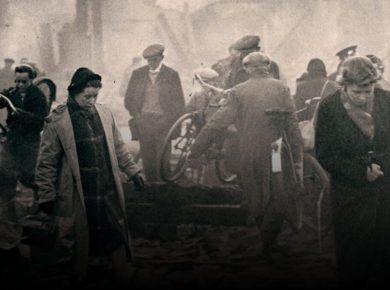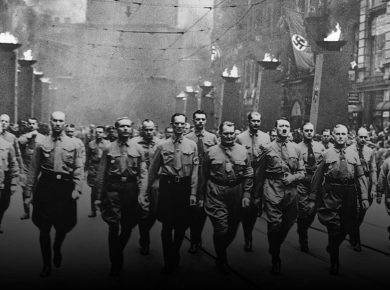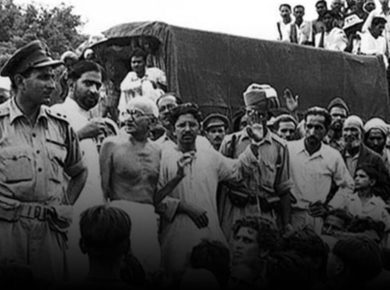Industrial Revolution – 18th century
Change in Mode of Production
- The mode of production changed from Guild System to Putting-Out System to Factory System.
- There was decline of the Guild System, when the volume of trade increased further, and the Guilds were unable to cope with the demand as they were unsuited for mass production.
- This resulted in coming of Putting-Out System, under which the raw material and the final product were owned by the merchant and the worker was only a wage earner. The site of work was the home or the backyard of the worker.
- The invention of machines changed everything and even this system was replaced by Factory System, under which the centre of production shifted from home to the factory. The workers, for the first time now, travelled from home to worksites on daily basis. They for the first time aggregated in such large numbers under a shed working on machines.
Industrial Revolution
- It happened first in England in mid-18th century.
- It was the revolution in the economic processes of production of goods in the economy, aided by technological innovations, which gave a boost to the pace at which goods could be produced.
Why Industrial Revolution first in England?
- End of Feudalism & rise of capitalism
- Renaissance & Reformation + democracy via Glorious Revolution 1688
- Accumulation of money from trade with the rest of the world
- Being an island, England had a natural barrier [arr] Protection + Natural harbours
- Rich in natural resources like coal and iron
- Natural network of tributaries of navigable rivers [arr] cheaper transport of goods and raw materials
Components of Industrial Revolution
- Started with revolution in the Textile Industry
- Development of powerloom running on hydropower + Development of cotton gin
- Development of Steam Engine by James Watt in 1769
- Deployed for running spinning machines and for powerlooms + used in coal mines to pump out water
- Water transport using steam powered ships was much cheaper than transport through land
- Development of Blast furnaces, which allowed for use of coke instead of charcoal
- Allowed the British steel industry to produce high-grade cast iron instead of just the pig iron.
- Macadamized Roads + Development of rail-road network complemented by Canal Network building.
- Business transactions could be affected from remote locations with the arrival of Postal services & telegraph.
- New farm machinery reduced the labour requirement in the agriculture sector & led to the production of more cash crops.
- Enclosure Movement led to availability of lot of labour for the industry in the towns.
The Enclosure Movement was led by the big landlords, who in connivance with the legislators in Parliament, increased their farm landholdings by taking over the small landholdings of marginal peasants and the village commons. Thus, a lot of labor was actually available for the industry in the towns & the labor surplus ensured cheaper labor costs and thus more profits to the businessmen.
Impact of Industrial Revolution
- Britain’s economy came to be dominated by the Industrial sector, rather than the Agriculture sector.
- Boosted exports and conversely imports of raw material
- Urban areas became the centers of production rather than center for trade and administration.
But it also led to –
- Crowding in cities, which led to problems of housing and sanitation
- Aim was to maximize profits and thus the wages of workers were paltry
- Child labour and participation of women in labour force increased, as they were available at cheaper wages
- Little was done for the social security of the workers + working conditions in the factories
- Led to development of resentment and many worker movements
- Hastened the arrival of Socialism
In a way, Industrial Revolution increased the penetration of democracy in England. The growing resentment among the workers and their consequent movements made the government conscious that Laissez Faire is not the sine qua non & the State has a responsibility to protect the vulnerable sections, if Capitalism itself is to be protected from workers revolution.
It further resulted into –
- Resulted in increased contact between Industrialized and non-industrialized world
- Demand for raw materials and export markets made the colonial powers to look for more territories to colonize
- 19th century witnessed a race for colonies among European nations
Thus, Industrial Revolution played an important role in emergence of Imperialism whereby the colonial powers tried to establish much stronger control over the colonies by use of military power, direct rule & rule by intermediaries.
Emergence of Industrial Revolution in West
In Europe, the end of Napoleonic wars in 1815 brought an atmosphere in which the nations could focus on Industrial development. Machines were introduced in many European nations after 1815, but the movements for democracy, independence and unification of territories didn’t allow Industrial Revolution to take root till 1871.
- Russian (Last European nation) industrial production got a boost when Serfdom was abolished in 1861
- USA industry started developing after independence from Britain in 1783 [arr] Boosted after 1870
- Industrial Revolution took place in Japan in late 19th century.












1 comment
thankyou very much to share the knowledge.